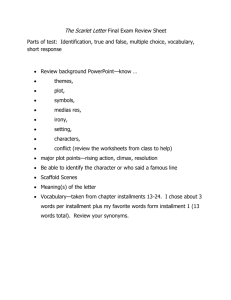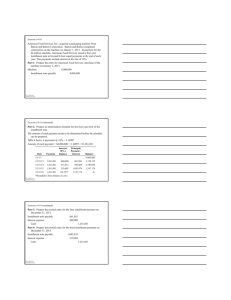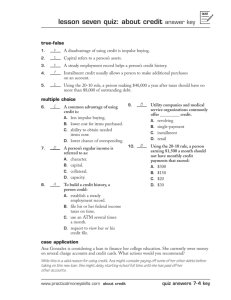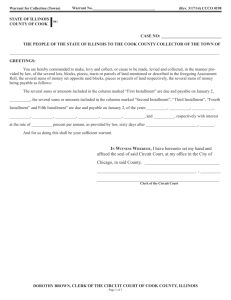Timber Income Tax Harry L. Haney, Jr., Ph.D.
advertisement
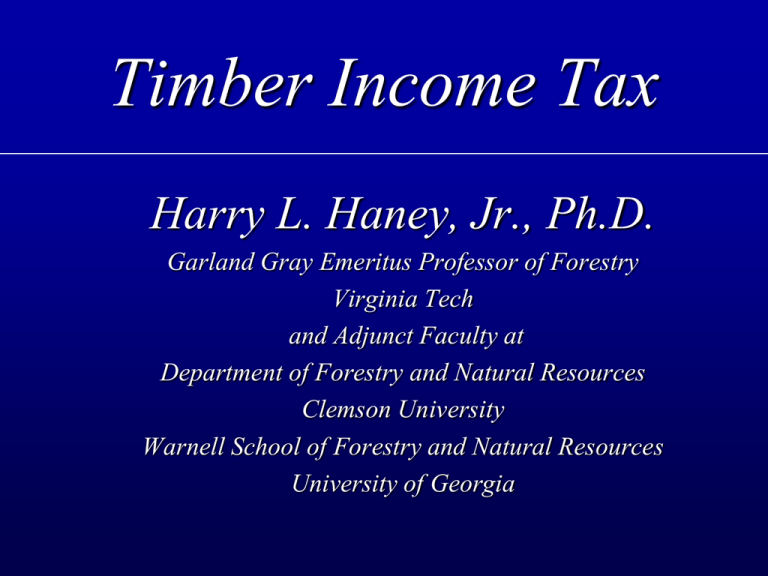
Timber Income Tax Harry L. Haney, Jr., Ph.D. Garland Gray Emeritus Professor of Forestry Virginia Tech and Adjunct Faculty at Department of Forestry and Natural Resources Clemson University Warnell School of Forestry and Natural Resources University of Georgia Income Leveling Strategies Chapter 7 Income Leveling Strategies • Harvesting small parcels annually to spread income is usually impractical • Income averaging was repealed in 1986, and was re-enacted for farmers, but forestry was omitted in the most recent legislation • This leaves two options: – Deferred payment contracts and – Installment sales under IRC § 453 • See p 7.1 Deferred Payment Contract (DPC) • They would delay recognition of income from timber sale until the next tax year • It is an arrangement whereby seller receives full payment in a later tax year • Taxpayer must use “cash basis” accounting • Sellers holding DPCs cannot sell, transfer, pledge, or convey the contract, or rights in the contract • See p 7.1 IRS Has Challenged DPCs Under Constructive Receipt Doctrine • “Income” is considered constructively received by a taxpayer in any year in which: • It is credited to his (her) account • Set aside for him (her) • Made available for drawing upon at any time • Can be drawn on with notice of intent • Begins on p 7.1 Constructive Receipt (CR) • IRC § 1.451-2(a) limits constructive receipt • But, IRS Regulations do not define CR • Thus, determination of constructive receipt is a question of fact, and the burden of proof shifts to taxpayer • He (she) must establish that amount received was not unqualifiedly subject to his (her) demand, but if this doesn't work try installments • See p 7.2 Installment Sales – IRC § 453 • A disposition of timber when at least one income payment is received in a later tax year • Installment sale treatment is automatic • But, dispositions of personal property included in inventory do not qualify, • However, standing timber is not inventory • And, sale of real property by a dealer (business) does not qualify • Begins on p 7.2 “Dealer Disposition” • This does not include property used in farming under the meaning of IRC §2032A • A farm includes woodland under IRC § 2032A • A lump-sum sale contract must be used • Payments with a pay-as-cut contact under IRC § 631(b) cannot be reported under the installment sales method • Installment sales do not apply to rent or losses • Begins on p 7.2 Installment Sale Is Automatic – Taxpayer Must Elect Out If Desired • To elect out, a written election is filed before due date in the year of sale • If transaction fails to qualify, or when electing out, regular accounting method is used • Entire gain reported in year of sale even though some payments come later • When electing out, the installment sale obligation is calculated at its FMV • See p 7.3 Installment Sale Income -Interest Portion • Stated interest must be reported separately as ordinary income • Interest is imputed if lower than IRS “test rate” • Imputed interest rules apply only – If one or more payments is due more than 6 months after date of sale, and – The contract amount exceeds $3,000 • See p 7.4 Installment Sale Income – Non-interest Portion • Gross profit percentage is determined by dividing the gain from the sale (contract price minus basis and cost of sale) by the contract price • Each payment including a down payment is multiplied by the gross profit percentage • As noted, interest was subtracted and reported separately • See p 7.4 Escrow Account • An irrevocable account out of which payments and interest are to be made • Account is irrevocable if buyer cannot revoke or recall funds to his (her) own use • Must place substantial restriction on the seller’s right to receive sale proceeds • Must be a real and definite restriction on seller or a specific economic benefit conferred on the buyer • See p 7.5 Sales To Related Parties • Installment sales to a related party who makes a second sale within two years of the first sale invokes a special rule • Part or all of the second sale is treated by original seller at the time of the second sale as if he (she) had received it from the first sale • Begins on p 7.5
